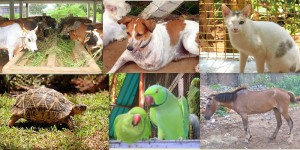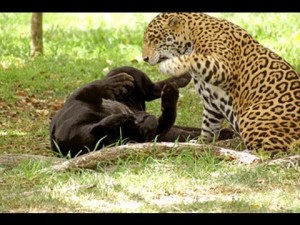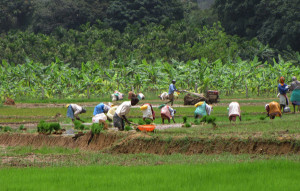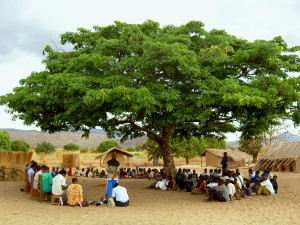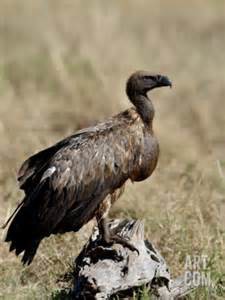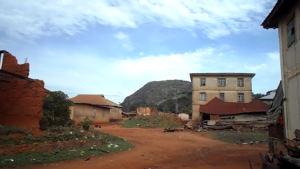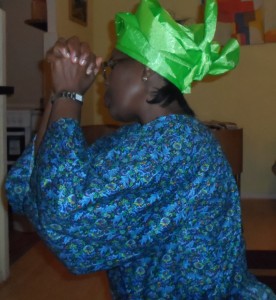Ni ayé igbà kan ri, àwọn ẹranko ni ọjà ti wọn. Ni ọjọ́ ọjà, Kìnìún, Ajá, Ìgalà, Ikõkò, Kọ̀lọ̀kọ̀lọ̀, Erin, Ẹkùn, Ìjàpá, Ọ̀kẹ́rẹ́, Eku-Asin, àti àwọn ẹranko yoku gbé irè oko àti ẹrù fún títà wá si ọjà. Erin ni Olóri ọjà, Kìnìún ni igbá keji. Gbogbo ẹranko mọ àlébù ara wọn. Wọn mọ̀ pé Asin fẹ́ràn ijà, bẹni òfófó àti àtojúbọ̀ ni àlébù Ìjàpá.
Ni ọjọ́ kan, ijà bẹ́ silẹ̀ laarin Ọ̀kẹ́rẹ́ àti Asin. Ki ṣe pé àwọn ẹranko yoku kò lè làjà yi, ṣùgbọ́n wọn rò pé Asin ti tún gbé iṣe rẹ̀ dé nitori ó fẹ́ràn ijà, nitori eyi, wọn kò dá si ijà. Ìjàpá fi ìsọ̀ rẹ̀ silẹ̀, ó sá lọ wòran ijà. Nigbati ó dé ibi ijà, ó rò pé Asin lágbára ju Ọ̀kẹ́rẹ́ lọ, ó kó si wọn laarin. Eku-Asin kò fẹ́ràn Ìjàpá nitori ki gbọ tara ẹ, nitori eyi, inú bi i, ó fi Ọ̀kẹ́rẹ́ silẹ̀, ó kọjú ijà si Ìjàpá. Ó fi ibinú gé imú Ìjàpá jẹ. Ìjàpá bẹ̀rẹ̀ si ké igbe pẹ̀lú orin yi nitoÌri ki àwọn ẹranko yoku lè gba ohun lọwọ Asin:
Asín tòhun Ọ̀kẹ́rẹ́ —————– jo mi jo
Àwọn ló jọ njà ———————- jo mi jo
Ìjà ré mo wá là ———————-jo mi jo
Asín wá fi mí ni mú jẹ ———— jo mi jo
Ẹ gbà mí lọwọ́ rẹ̀ —————— jo mi jo
Àwò mí mbẹ lọ́jà ——————-jo mi jo
Àwọn ẹranko yoku kọ̀ lati gba Ìjàpá lọwọ Asin, dipò ki wọn làjà gẹ́gẹ́ bi orin arò Ìjàpá, yẹ̀yẹ́ ni wọn bẹ̀rẹ̀ si ṣe, pé Ìjàpá ri ẹ̀san òfófó. Nigbati Ìjàpá ri pé àwọn ẹranko yoku kò ṣetán lati gba ohun, ó lo ọgbọ́n inú rẹ̀ lati tu ara rẹ̀ silẹ̀. Ó fa imú rẹ àti ẹnu Asin wọ inú ikarawun rẹ, ó pa ikarawun dé mọ ẹnu Ọ̀kẹ́rẹ́. Asin bẹ̀rẹ̀ si jà pàtàpàtà lati tú ẹnu rẹ̀ silẹ̀. Bi ó ti dura bẹni ẹnu rẹ̀ gùn si titi ó fi já. Ìjà yi ló sọ Asin di ẹlẹ́nu gígùn, ti ó sọ Ìjàpá di onímú kékeré titi di ọjọ́ òni.
Ẹ̀kọ́ itàn yi ni pé kò si èrè rere ninú ijà tàbi iwà òfófó nitori igbẹhin àlébù wọnyi ki i dára.
ENGLISH TRANSLATION
Continue reading
Originally posted 2015-05-01 06:30:37. Republished by Blog Post Promoter


